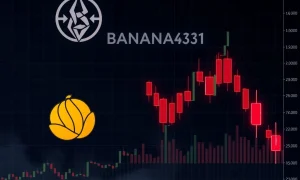The financial landscape is rapidly evolving, ushering in a new era where traditional assets meet cutting-edge blockchain technology. For investors and entrepreneurs seeking stability and innovation, a pivotal development has just occurred. OpenEden, a leading real-world asset (RWA) tokenization platform, recently announced a landmark partnership with The Bank of New York Mellon Corporation (BNY Mellon). This collaboration will see BNY Mellon manage and custody the underlying assets for OpenEden’s flagship **tokenized US Treasury** product, TBILL. This move signals a significant advancement for institutional engagement in blockchain-based finance and underscores the growing demand for regulated, on-chain financial solutions. It truly represents a groundbreaking step in bridging conventional finance with the burgeoning digital asset space.
Tokenized US Treasury: A New Era for On-Chain Assets
OpenEden’s partnership with BNY Mellon marks a significant milestone for the burgeoning field of **tokenized US Treasury** assets. Essentially, tokenization transforms traditional financial instruments, like US Treasury Bills, into digital tokens on a blockchain. This process offers several advantages, including enhanced liquidity, greater transparency, and 24/7 accessibility. The TBILL product, launched by OpenEden in 2023, provides investors with blockchain-based access to a pool of short-dated US Treasury Bills and overnight reverse repurchase agreements.
Crucially, TBILL stands out as the first **tokenized US Treasury** fund with a Moody’s “A” rating to have its assets managed by a global custodian. A Moody’s “A” rating indicates upper-medium-grade quality, signifying low credit risk and a strong capacity to meet financial obligations. This high rating is considered very safe by traditional finance standards, instilling confidence in institutional investors. OpenEden founder and CEO Jeremy Ng emphasized that combining their platform with BNY Mellon’s “deep fiduciary expertise” creates a new standard of trust in the digital asset space. This collaboration provides a secure and compliant pathway for institutions to access the benefits of tokenized assets.
BNY Mellon’s Strategic Leap into Digital Assets
BNY Mellon, one of Wall Street’s largest and oldest custodians, continues to deepen its footprint in the digital asset sector. This latest partnership with OpenEden reinforces its strategic vision to serve as a crucial bridge between traditional finance and emerging technology. The bank has been actively involved in the digital asset space since 2022. For instance, it launched a digital custody platform to safeguard institutional clients’ Bitcoin (BTC) and Ether (ETH) holdings. This service allows the bank to store private keys and provides comprehensive bookkeeping services for fund managers across various digital assets.
Furthermore, BNY Mellon expanded its crypto presence on April 3 by launching a digital assets data insights product. This innovative product delivers both on-chain and off-chain data across multiple blockchain networks. Such initiatives demonstrate the bank’s commitment to providing robust infrastructure for the digital economy. More recently, the bank collaborated with Goldman Sachs on a money market fund project. In July, both companies announced plans to offer institutional investors access to tokenized money market funds. This initiative aims to unlock 24/7 market access and real-time settlement capabilities within capital markets, showcasing the transformative potential of tokenization for traditional financial products like **tokenized US Treasury** bills.
Understanding the Mechanics of Tokenized US Treasury Funds
The operational mechanics behind OpenEden’s **tokenized US Treasury** fund, TBILL, are designed for clarity and security. When an investor mints a TBILL token, it represents a fractional share of the underlying portfolio. This portfolio consists of short-term US Treasury Bills and overnight reverse repurchase agreements. The associated yield from these traditional assets is then passed on to the token holders. This structure ensures that the digital token directly reflects the value and performance of highly stable, traditional financial instruments.
In this new partnership, BNY Mellon plays a dual, critical role. Firstly, Dreyfus, BNY Mellon’s investment management arm, will act as the sub-manager of the TBILL fund. This ensures professional oversight and management of the underlying traditional assets. Secondly, BNY Mellon itself will serve as the primary custodian for these underlying assets. They leverage their extensive infrastructure and long-standing expertise in asset custody. This arrangement provides an unparalleled layer of security and trust, as a globally recognized financial institution directly manages the physical assets backing the digital tokens. Jose Minaya, BNY Mellon’s global head of investments and wealth, stated that the bank sees itself as a crucial intermediary, aiming to cover the full lifecycle of tokenized assets.
The Growing Demand for Regulated Digital Cash Management
OpenEden has reported a significant increase in demand for its TBILL product. This surge reflects a broader market trend: a strong interest in regulated, on-chain cash-management solutions. In an increasingly interconnected global economy, investors seek efficient and secure ways to manage their capital. **Tokenized US Treasury** bills offer a compelling solution by combining the stability and security of government-backed securities with the efficiency and accessibility of blockchain technology. This allows for instant settlement, reduced counterparty risk, and increased transparency compared to traditional methods.
The appeal extends beyond just efficiency. Tokenized assets provide a gateway for crypto-native firms and institutional investors to diversify their portfolios with stable, yield-bearing assets without leaving the blockchain ecosystem. This integration is vital for the maturation of the digital asset market. It offers a bridge for large-scale capital to flow into decentralized finance (DeFi) in a compliant and secure manner. This trend also aligns with the broader movement towards real-world asset (RWA) tokenization, which aims to bring a vast array of tangible and intangible assets onto the blockchain. The partnership between OpenEden and BNY Mellon serves as a powerful validation of this trend.
Paving the Way for Future Tokenized US Treasury Innovations
This strategic alliance between OpenEden and BNY Mellon sets a significant precedent for the future of finance. It validates the utility and potential of **tokenized US Treasury** assets as a core component of digital financial infrastructure. The successful integration of a top-tier global custodian into the tokenization ecosystem paves the way for broader institutional adoption of digital assets. It also encourages further innovation in creating new financial products on the blockchain. We can anticipate more traditional financial institutions exploring similar partnerships or developing their own tokenization capabilities.
The implications extend beyond just US Treasuries. This model could easily be replicated for other stable, high-quality assets, leading to a proliferation of tokenized real-world assets. As regulatory clarity improves and technological infrastructure matures, the digital asset space will likely see even more sophisticated financial products emerge. The collaboration signifies a crucial step towards a future where digital assets are seamlessly integrated into the global financial system, offering enhanced efficiency, accessibility, and trust for all participants. This partnership is not merely about a single product; it is about building the foundation for the next generation of financial markets.
Conclusion
The partnership between OpenEden and BNY Mellon to manage **tokenized US Treasury** assets represents a monumental stride in the convergence of traditional finance and blockchain technology. By combining OpenEden’s innovative tokenization platform with BNY Mellon’s established custodial expertise and institutional trust, this collaboration sets a new benchmark for secure and regulated digital asset management. It addresses the increasing demand for on-chain cash solutions and paves the way for greater institutional participation in the digital economy. This development solidifies the role of tokenized real-world assets as a critical component of future financial markets, promising enhanced efficiency, liquidity, and accessibility for investors worldwide.
Frequently Asked Questions (FAQs)
What are Tokenized US Treasury Assets?
Tokenized US Treasury assets are digital representations of traditional US Treasury Bills or bonds on a blockchain. Each token represents a fractional ownership of the underlying government security, allowing investors to access these stable assets with the benefits of blockchain technology, such as 24/7 trading and faster settlement.
How does BNY Mellon’s partnership with OpenEden enhance trust?
BNY Mellon, as one of the world’s largest and oldest custodians, brings deep fiduciary expertise and a long history of trust to the partnership. Their role in managing and custodying the underlying assets of OpenEden’s TBILL fund provides institutional-grade security and oversight, significantly enhancing confidence in the **tokenized US Treasury** product.
What is OpenEden’s TBILL product?
TBILL is OpenEden’s flagship tokenized US Treasury product, launched in 2023. It provides investors with blockchain-based access to a pool of short-dated US Treasury Bills and overnight reverse repurchase agreements. The TBILL token represents a share of this underlying portfolio and its associated yield.
What does a Moody’s “A” rating mean for the TBILL fund?
A Moody’s “A” rating signifies that the asset is of upper-medium-grade quality. This indicates a low credit risk and a strong capacity for the fund to meet its financial obligations. For investors, particularly institutions, this rating underscores the safety and reliability of the **tokenized US Treasury** fund.
How does this partnership impact the broader digital asset market?
This partnership is a significant validation for real-world asset (RWA) tokenization and the broader digital asset market. It demonstrates that major traditional financial institutions are increasingly willing to engage with blockchain technology for core financial products. This could lead to increased institutional adoption, greater liquidity, and the development of more sophisticated tokenized financial instruments.








